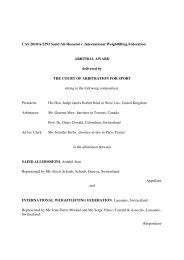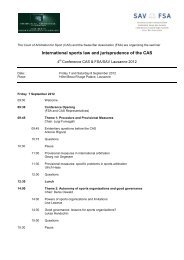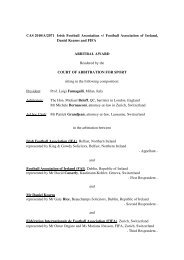(CAS) Bulletin - Tribunal Arbitral du Sport / TAS
(CAS) Bulletin - Tribunal Arbitral du Sport / TAS
(CAS) Bulletin - Tribunal Arbitral du Sport / TAS
Create successful ePaper yourself
Turn your PDF publications into a flip-book with our unique Google optimized e-Paper software.
C. The jurisdiction of the IFA Arbitrator<br />
The crux of the Appellant’s case is the alleged lack<br />
of jurisdiction of the IFA Arbitrator. The Appellant<br />
argues that the Contract provided solely for the<br />
jurisdiction of FIFA bodies and, indirectly, of the<br />
<strong>CAS</strong> as the appellate instance vis-à-vis the FIFA<br />
bodies.<br />
The Appellant relies on Article 4.28 of the Contract,<br />
which sets forth the following dispute settlement<br />
clause: “ In case the disputes and differences are not settled<br />
by means of negotiations, the Parties shall have the right to<br />
address to competent FIFA bodies. (All in accordance with<br />
the provisions stipulated under Article 22 of the FIFA<br />
Regulations) ”.<br />
The Panel notes that two important elements can be<br />
ascertained from the very text of Article 4.28 of the<br />
Contract. First, the jurisdiction of FIFA bodies is not<br />
indicated as a mandatory exclusive jurisdiction, given<br />
that the parties are attributed “ the right ” rather than<br />
the <strong>du</strong>ty to bring the dispute before FIFA. Second,<br />
the right to address the FIFA bodies is qualifi ed by<br />
the necessary compliance (“ all in accordance ”) with<br />
Article 22 of the FIFA Agents Regulations. This<br />
means, in the Panel’s view, that the right granted<br />
by Article 4.28 of the Contract may be lawfully<br />
exercised only if it is in compliance with Article 22 of<br />
the FIFA Agents Regulations. This construction is<br />
strengthened by the fact that, pursuant to Article 4.1<br />
of the Contract, the Parties have contractually agreed<br />
that their relationship is subject to the FIFA Agents<br />
Regulations.<br />
Article 22 of the FIFA Agents Regulations – the<br />
2001 edition, which is applicable in the present case<br />
given that the dispute arose in 2007, before the entry<br />
into force of the 2008 edition – so provides:<br />
“ 1. In the event of disputes between a players’ agent and a<br />
player, a club and/or another players’ agent, all of whom are<br />
registered with the same national association (national disputes),<br />
the national association concerned is responsible. It is obliged to<br />
deal with the case and pass a decision, for which service it is<br />
entitled to charge an appropriate fee.<br />
2. Any other complaint not covered by par. 1 shall be submitted<br />
to the FIFA Players’ Status Committee ”.<br />
The Panel observes that Article 22 of the FIFA<br />
Agents Regulations confers mandatory jurisdiction<br />
on national federations whenever disputes arise<br />
between indivi<strong>du</strong>als or entities that are registered<br />
with the same national federation. Those are defi ned<br />
as “national disputes”. All other disputes are considered<br />
as international disputes and are resi<strong>du</strong>ally attributed<br />
to the jurisdiction of the FIFA-PSC. Therefore, the<br />
only relevant criterion is the common registration<br />
of the disputing parties with the same national<br />
federation; nationality, domicile or other criteria<br />
are utterly irrelevant under Article 22. Accordingly,<br />
in the present case the fact that the Player is of<br />
Ghanaian nationality or has been playing with the<br />
Ghana national team is immaterial.<br />
In the Panel’s view, the pertinent point in time to<br />
establish whether a dispute is national or international<br />
is necessarily the moment when the dispute arises,<br />
that is, more precisely, the moment when a claim<br />
by either party is fi rst fi led. This occurred in March<br />
2007, when the Agent fi led his claim with the<br />
FIFA-PSC against the Player. At that time, both the<br />
Agent (who had received his agent’s licence from<br />
the IFA) and the Player (who had signed a contract<br />
with the Israeli club Beitar FC) were undoubtedly<br />
registered with the IFA. The Panel does not share the<br />
Appellant’s view that the relevant moment in time<br />
would rather be when the Contract was signed – with<br />
the consequence that, as the Player was registered at<br />
that time with the Swedish federation, the dispute<br />
would be “international ” and the FIFA-PSC would<br />
have jurisdiction – because (i) the text of Article<br />
22.1 of the FIFA Agents Regulation clearly makes<br />
reference to the moment when a dispute arises (“In the<br />
event of disputes (…)”), and (ii) it is a general proce<strong>du</strong>ral<br />
principle that jurisdictional issues must be addressed<br />
taking into account the moment when a claim is fi rst<br />
fi led.<br />
Accordingly, the Panel fi nds that, when the present<br />
dispute arose, Article 22 of the FIFA Agents<br />
Regulations pointed to the IFA as the organization<br />
having the authority to solve the dispute. The Panel<br />
observes, however, that this would not have been<br />
enough in and of itself if the IFA did not have a<br />
dispute settlement system in place and if the parties<br />
were not bound to it. In fact, Article 22 requires<br />
all national federations to establish such a dispute<br />
settlement system but, if the competent federation<br />
has not established it, the parties would necessarily<br />
have to submit their complaint to the FIFA-PSC even<br />
in case of a national dispute (as it would be under<br />
Article 22.2 a “complaint not covered by par. 1”).<br />
The Panel has alr eady noted that the IFA did put in<br />
place an arbitration mechanism to deal with national<br />
disputes and thus did comply with Article 22 of the<br />
FIFA Agents Regulations. Indeed, Article 14, paras.1,<br />
2 and 3, of the Israeli Agents Regulations reads as<br />
follows (as translated from Hebrew):<br />
“ 14.1 Any disagreement or dispute between a players’ agent<br />
and a player, or between a players’ agent and a club or<br />
Jurisprudence majeure / Leading cases<br />
-<br />
71





